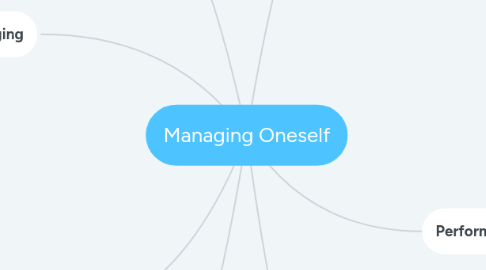
1. Values
1.1. Mirror test
1.1.1. "What kind of person do I want to see in the mirror in the morning?"
1.2. Organizations have values
1.2.1. Do not need to be the same, but close enough to coexist.
1.2.1.1. If not, the person will be frustrated and lead to non-performance
1.2.2. Examples
1.2.2.1. Short term results VS Long Term
1.2.2.1.1. Pharmaceuticas
1.2.2.2. New employees VS Current Employees
1.2.2.2.1. Merge of two companies
2. Belonging
2.1. Should be in line with
2.1.1. Strengths
2.1.2. Performance
2.1.3. Values
2.2. At least know where you don not belong
2.3. In the presence of an opportunity you can say: " I can do it, but I need this is the way I should do it."
2.4. Careers are not planned, they develop with the correct opportunities.
3. Contribution
3.1. Address 4 elements
3.1.1. Whar does the situation require?
3.1.2. Given my characteristics, how can I make the greatest contribution?
3.1.3. What results have to be met to make a difference?
3.1.3.1. Results should be
3.1.3.1.1. Hard to achieve but within reach
3.1.3.1.2. Meaningful
3.1.3.1.3. Visible and measurable
3.1.4. How can I achieve results that make a difference within a month?
3.2. A plan cannot be longer than 18 months
4. Second Carreer
4.1. Ways of developing it
4.1.1. Second carrer
4.1.1.1. Moving from one organization to another
4.1.1.2. Move to another line of work
4.1.2. Parallel career
4.1.2.1. Stay on the work they have been doing as consultant and have a parrallel job, usually NGO.
4.1.3. Social venture
4.1.3.1. Very successful in first career, but no longer challenges them
4.1.3.2. Start another activity, usually a nonprofit
4.2. Reasons to do it
4.2.1. Boredom
4.2.2. Having other options for success
4.2.3. Serious setbacks in life or work
4.3. Have to start before the first carrer "ends"
5. Strengths
5.1. Feedback analysis
5.1.1. Whenever a key decision or action is done write the expected outcome and compare the results
5.1.1.1. 18 months at most
5.1.2. Invented by theologian, used by John Calvin (Calvinists) and Ignatious Loyola (Jesuit order)
5.1.3. After 2-3 years you know
5.1.3.1. Where strengths lie
5.1.3.2. What things are depriving you from strengths
5.1.3.3. Which are not your stregths
5.1.3.3.1. better to move from a good performer to an excelent one than from a bad to a mediocre
5.1.4. Implications to follow action
5.1.4.1. Concentrate on strengths
5.1.4.2. Work on improving strengths - gaps in knowledge
5.1.4.3. Disabling ignorance - do not take pride in not knowing things
5.1.4.4. Remove bad habits
5.1.4.4.1. Quickly show up
5.1.4.4.2. Check for lack of courtesy
6. Performance
6.1. Reading VS Listening
6.2. Learning style
6.2.1. Writing
6.2.2. Talking
6.2.3. Reading
6.2.4. Listening
6.2.5. Doing
6.3. Teamwork VS Alone
6.3.1. Work best in what type of relationship
6.3.1.1. Subordinates
6.3.1.2. Team member
6.3.1.3. Coach or mentor
6.4. Decision maker VS Advisor
6.5. Stress VS Structured and predicable environment
6.6. Big Organization VS Small Organization
7. Relationships
7.1. Accept people as individuals
7.1.1. Boss
7.1.1.1. They are entitled to work how they find best
7.1.1.2. Observe them to find how they work
7.1.1.3. Adapt to make work most effective
7.1.2. Coworkers
7.1.2.1. Make use of strengths, way of working, and values
7.2. Responsability of communication
7.2.1. Explain strengths, way of working and values
7.2.2. Ask strengths, way of working and values
7.2.3. Trust doesn't mean they like each other, but understand one another.

